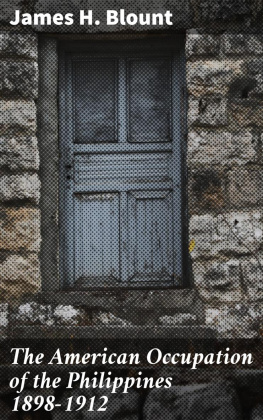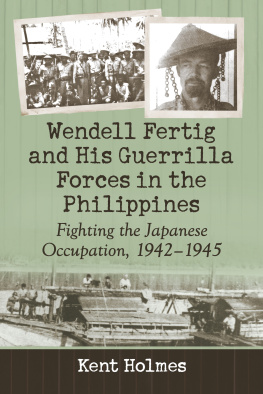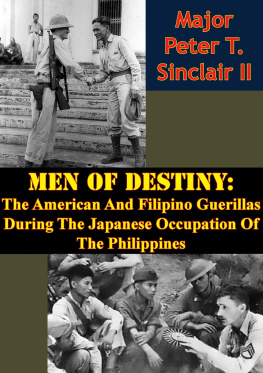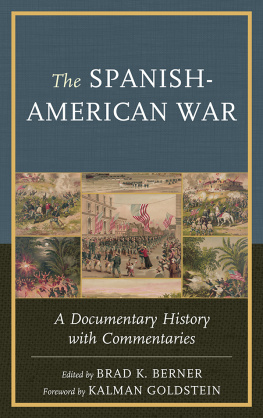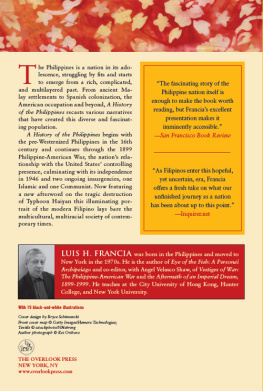Any narrative covering our acquisition of the Philippine Islands must, of course, centre in the outset about Admiral Dewey, and the destruction by him of the Spanish fleet in Manila Bay on Sunday morning, May 1, 1898. But as the Admiral had brought Aguinaldo down from Hong Kong to Manila after the battle, and landed him on May 19th to start an auxiliary insurrection, which insurrection kept the Spaniards bottled up in Manila on the land side for three and a half months while Dewey did the same by sea, until ten thousand American troops arrived, and easily completed the reduction and capture of the beleaguered and famished city on August 13th, it is necessary to a clear understanding of the de facto alliance between the Americans and Aguinaldo thus created, to know who brought the Admiral and Aguinaldo together and how, and why.
The United States declared war against Spain, April 21, 1898, to free Cuba, and at once arranged an understanding with the Cuban revolutionists looking to co-operation between their forces and ours to that end. For some years prior to this, political conditions in the Philippines had been quite similar to those in Cuba, so that when, two days after war broke out, the Honorable Spencer Pratt, Consul-General of the United States at Singapore, in the British Straits Settlements, found Aguinaldo, who had headed the last organized outbreak against Spain in the Philippines, temporarily sojourning as a political refugee at Singapore, in the Filipino colony there, he naturally sought to arrange for his co-operating with us against Spain, as Gomez and Garcia were doing in Cuba. Thereby hangs the story of Mr. Pratts Serenade. However, before we listen to the band whose strains spoke the gratitude of the Filipinos to Mr. Pratt for having introduced Aguinaldo to Dewey, let us learn somewhat of Aguinaldos antecedents, as related to the purposes of the introduction.
The first low rumbling of official thunder premonitory to the war with Spain was heard in Mr. McKinleys annual message to Congress of December, 1897, wherein he said, among other things:
The most important problem with which this government is now called upon to deal pertaining to its foreign relations concerns its duty toward Spain and the Cuban insurrection.
In that very month of December, 1897, Aguinaldo was heading a formidable insurrection against Spanish tyranny in the Philippines, and the Filipinos and their revolutionary committees everywhere were watching with eager interest the course of The Great North American Republic, as they were wont to term our government.
The Report of the First Philippine Commission sent out to the Islands by President McKinley in February, 1899, of which President Schurman of Cornell University was Chairman, contains a succinct memorandum concerning the Filipino revolutionary movement of 18967, which had been begun by Aguinaldo in 1896, and had culminated in what is known as the Treaty of Biac-na-Bato,February 15, 1898, Then they knew there would be something doing. Hong Kong being the cross-roads of the Far East and the gateway to Asia, and being only sixty hours across the choppy China Sea from Manila, was the best place in that part of the world to brew another insurrection against Spain. But Singapore is also a good place for a branch office for such an enterprise, being on the main-travelled route between the Philippines and Spain by way of the Suez Canal, about four or five days out of Hong Kong by a good liner, and but little farther from Manila, as the crow flies, than Hong Kong itself. Owing to political unrest in the Philippines in 189678, there was quite a colony of Filipino political refugees living at Singapore during that period. Aguinaldo had gone over from Hong Kong to Singapore in the latter half of April, 1898, arriving there, it so chanced, the day we declared war against Spain, April 21st. He was immediately sought out by Mr. Pratt, who had learned of his presence in the community through an Englishman of Singapore, a former resident of Manila, a Mr. Bray, who seems to have been a kind of striker for the Filipino general. Aguinaldo had come incognito. Out of Mr. Pratts interview with the insurgent chief thus obtained, and its results, grew the episode which is the subject of this chapter.
A word just here, preliminary to this interview, concerning the personal equation of Aguinaldo, would seem to be advisable.
While I personally chased him and his outfit a good deal in the latter part of 1899, in the northern advance of a column of General Lawtons Division from San Isidro across the Rio Grande de Pampanga, over the boggy passes of the Caraballa Mountains to the China Sea, and up the Luzon West Coast road, we never did
Any one acquainted with General Bell knows that he knows what he is talking about when he speaks of a natural leader of men, for he is one himself. Our ablest men in the early days were the first to cease considering the little brown soldiers a joke, and their government an opera-bouffe affair. General Bell also says in the same report that he, Aguinaldo, is undoubtedly endowed in a wonderful degree with the power of creating among the people confidence in himself. He was, indeed, the very incarnation of the legitimate aspirations of his people, to use one of the favorite phrases of his early state papers, and the faithful interpreter thereof. That was the secret of his power, that and a most remarkable talent for surrounding himself with an atmosphere of impenetrable reserve. This last used to make our young army officers suspect him of being what they called a four-flusher, which being interpreted means a man who is partially successful in making people think him far more important than he really is. But we have seen General Bells estimate. And the day Aguinaldo took the oath of allegiance to the United States, in 1901, General MacArthur, then commanding the American forces in the Philippines, signalized the event by liberating 1000 Filipino prisoners of war. General Funston, the man who captured him in 1901, says in Scribners Magazine for November, 1911, He is a man of many excellent qualities and * * * far and away the best Filipino I was ever brought in contact with.
Aguinaldo was born in 1869. To-day, 1912, he is farming about twenty miles out of Manila in his native province of Cavite; has always scrupulously observed his oath of allegiance aforesaid; occasionally comes to town and plays chess with Governor-General Forbes; and in all respects has played for the last ten years with really fine dignity the rle of Chieftain of a Lost Cause on which his all had been staked. He was a school-teacher at Cavite at one time, but is not a college graduate, and so far as mere book education is concerned, he is not a highly educated man. Whether or not he can give the principal parts of the principal irregular Greek verbs I do not know, but his place in the history of his country, and in the annals of wars for independence, cannot, and for the honor of human nature should not, be a small one. Dr. Rizal, the Filipino patriot whose picture we print on the Philippine postage stamps, and who was shot for sedition by the Spaniards before our time out there, was what Colonel Roosevelt would jocularly call one of these darned literary fellows. He was a sort of Sweetness and Light proposition, who only


